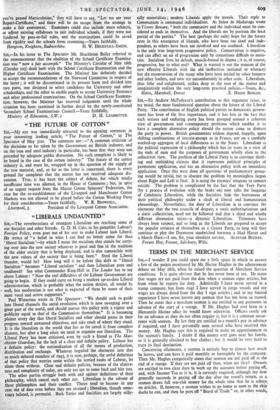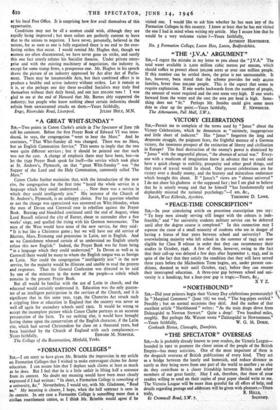TERMS IN THE MERCHANT SERVICE
SIR,—I wonder if you could spare me a little space in which to answer a few of the points mentioned by Mr. Hector Hughes in the adjournment debate on May 28th, when he raised the question of Merchant Service conditions. It is quite obvious that he has never been at sea. He states that wages are not paid from the date when a seaman signs articles, but from when he reports for duty. Admittedly I have never served in a tramp company, but from 1942 I have served in cargo vessels and my wages are always dated from the day I sign articles ; and in my limited experience I have never known any seaman that has not been so treated. Then he states that a merchant seaman is not entitled to any payments in advance of the start of a voyage. If Mr. Hughes had ever been to a Mercantile Marine office he would know otherwise. Officers rarely ask for an advance as they do not often require it, but it is a common occur- rence with seamen. By law they are entitled to a month's pay in advance if required, and I have personally seen several who have received this money. Mr. Hughes says this is required to make an apportionment to the seaman's family. I doubt if this money ever goes near his family, as it is generally obtained to buy clothes ; but it would be very hard to trace its final destination.
Concerning allotments, a seaman is entirely free to choose how much he leaves, and can have it paid monthly or fortnightly by the company. Then Mr. Hughes categorically states that seamen are not paid off at the end of a voyage. If they are not paid off then, when are they? Owners are entitled to two clear days to work up the accounts before paying off,, and, with Income Tax as it is, it is certainly required, although my firm generally succeeds in paying off the day after the vessel's return, as a seaman draws full war-risk money for the whole time that he is ashofe, on articles. If, however, a seaman wishes to go home as soon as the ship docks he can, and then he pays off "Board of Trade " or, in other words,
at his local Post Office. It is surprising how few avail themselves of this opportunity.
Conditions may not be all a seaman could wish, although they are rapidly being improved ; but most sailors are perfectly content to leave that to the unions to negotiate. I have never, personally, believed in the unions, for as soon as one is fully organised there is no end to the ever- lasting strikes that occur. I would remind Mr. Hughes that, though we seamen are often discontented, we have never gone on strike, and surely this one fact utterly refutes his Socialist theories. Under private enter- prise and with the existing machinery of negotiation, the industry is, except for some tramp firms, a prosperous one. Mr. Hughes in his speech draws the picture of an industry oppressed by Act after Act of Parlia- ment. There may be innumerable Acts, but their combined effect is to produce a healthy and active industry without strikes. Let it remain as it is, or else perhaps one day these so-called Socialists may truly find themselves without their daily bread, and not just 200,000 tons ! I was glad to see at the end of Hansard that Mr. Barnes ably supported the industry; but people who know nothing about certain industries should refrain from unwarranted attacks on them.—Yours faithfully,































 Previous page
Previous page